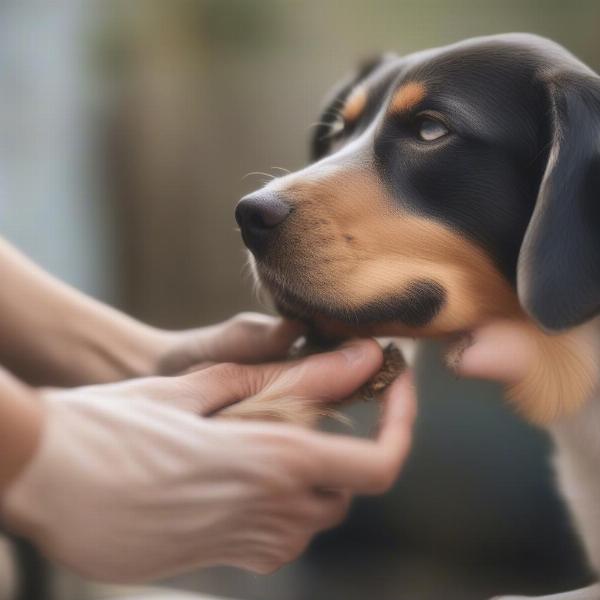Excessive paw licking in dogs can be a frustrating issue for both pet owners and their furry companions. While occasional licking is normal for grooming, persistent licking often signals an underlying problem. Understanding the potential causes and knowing some effective home remedies can help soothe your dog’s paws and address the root of the issue. This article explores common reasons why dogs lick their paws and provides practical home remedies you can try.
Why is My Dog Licking Their Paws Constantly?
Several factors can contribute to excessive paw licking, ranging from environmental irritants to underlying medical conditions. Identifying the cause is crucial for effective treatment. Common culprits include allergies (environmental or food), parasites (fleas, ticks, mites), dry skin, injuries (cuts, burns, thorns), infections (bacterial, fungal, yeast), and even boredom or anxiety.
Allergies and Irritants
Environmental allergies, such as pollen, grass, and dust mites, can cause itchy paws, leading to excessive licking. Similarly, food allergies can also manifest as paw licking. Identifying and eliminating the allergen is key to managing allergy-related paw licking.
Parasites
Fleas, ticks, and mites can irritate your dog’s skin, causing intense itching and subsequent licking. Regularly checking your dog for parasites and using preventative treatments is essential.
 Checking a dog's paw for parasites
Checking a dog's paw for parasites
Dry Skin and Injuries
Dry skin can be uncomfortable and itchy, prompting your dog to lick their paws for relief. Injuries like cuts, burns, or thorns can also cause pain and irritation, leading to increased licking.
Infections
Bacterial, fungal, and yeast infections can affect a dog’s paws, causing itching, redness, and sometimes even discharge. These infections require veterinary attention and may necessitate prescribed medications.
Boredom and Anxiety
In some cases, excessive paw licking can be a behavioral issue stemming from boredom or anxiety. Providing your dog with plenty of mental and physical stimulation can help alleviate this type of licking.
Home Remedies for Dog Paw Licking
If you suspect your dog’s paw licking is due to a minor issue like dry skin or a mild irritant, several home remedies can offer relief:
- Apple Cider Vinegar Soak: Dilute apple cider vinegar with water (1:1 ratio) and soak your dog’s paws for 5-10 minutes. This can help soothe irritated skin and combat yeast infections.
- Oatmeal Bath: Grind oatmeal into a fine powder and add it to your dog’s bathwater. Oatmeal has soothing properties that can relieve itching and inflammation.
- Coconut Oil: Applying coconut oil to your dog’s paws can moisturize dry skin and create a protective barrier against irritants.
- Epsom Salt Soak: Soaking your dog’s paws in warm water with Epsom salt can help reduce swelling and soothe irritated skin. This is particularly helpful for minor injuries.
- Chamomile Tea Soak: Cool chamomile tea can be used as a paw soak to reduce inflammation and soothe itchy skin.
Dr. Emily Carter, DVM, recommends, “While home remedies can be effective for minor paw irritation, it’s crucial to consult a veterinarian if the licking persists or worsens. Underlying medical conditions require professional diagnosis and treatment.”
Dr. David Miller, a certified veterinary dermatologist, adds, “Identifying and eliminating allergens is essential for managing allergy-related paw licking. This may involve dietary changes, environmental modifications, or allergy testing.”
When to See a Vet
While home remedies can provide temporary relief, it’s important to consult your veterinarian if:
- The licking is persistent and doesn’t improve with home remedies.
- Your dog’s paws are red, swollen, or have a discharge.
- Your dog is showing signs of pain or discomfort.
- You suspect an underlying medical condition.
Conclusion
Excessive paw licking in dogs can be a sign of various issues, from simple irritations to more serious medical conditions. While home remedies can be helpful for minor problems, it’s always best to consult your veterinarian for a proper diagnosis and treatment plan. Addressing the underlying cause is crucial for providing your furry friend with lasting relief and ensuring their overall well-being.
FAQ
- What does it mean when a dog licks their paws excessively? Excessive paw licking can indicate allergies, parasites, dry skin, injuries, infections, or even boredom and anxiety.
- Can I use human lotion on my dog’s paws? It’s generally best to avoid using human lotions on your dog’s paws, as they may contain ingredients that are harmful if ingested.
- How can I prevent my dog from licking their paws? Addressing the underlying cause is key to preventing paw licking. This may involve allergy management, parasite control, regular paw hygiene, and providing adequate mental and physical stimulation.
- Are there any over-the-counter medications for dog paw licking? It’s essential to consult your veterinarian before giving your dog any over-the-counter medications, as some may not be safe or appropriate for their condition.
- Can stress cause a dog to lick their paws? Yes, anxiety and stress can lead to excessive paw licking as a coping mechanism.
- How can I tell if my dog’s paw licking is serious? If the licking is persistent, accompanied by redness, swelling, discharge, or signs of pain, it’s important to seek veterinary attention.
- What is the best home remedy for dry dog paws? Coconut oil is a popular and effective home remedy for moisturizing dry dog paws.
Related Articles
ILM Dog is your trusted resource for comprehensive dog care information. We offer expert advice on breed selection, health care, training, nutrition, grooming, and much more. Our mission is to empower dog owners worldwide with the knowledge and resources they need to provide their canine companions with the best possible care. For inquiries regarding dog products, accessories, or any other dog-related concerns, contact us at [email protected] or call us at +44 20-3965-8624. Visit ILM Dog for more valuable insights into the world of dog care.